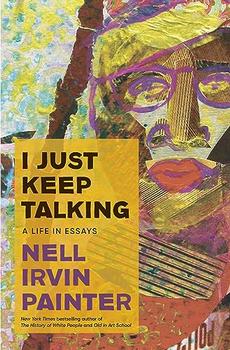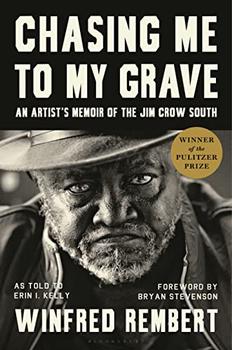Summary | Excerpt | Reviews | Beyond the book | Read-Alikes | Genres & Themes | Author Bio

A Life in Essays
by Nell Irvin PainterNell Irvin Painter's ninth book, I Just Keep Talking: A Life in Essays, is a collection of previously published work. The essays bear witness to history, art, politics, and black culture. From her unique lens as an artist and Princeton history professor emerita, Painter delivers intellectual think pieces that go beyond the easily digestible kind that become the subject of social media catfights. They reflect decades of scholarship. They are thought-provoking and complex. Reading them individually takes a while, but they are well worth the investment of poring over the pages, sometimes two or three times.
While the stunning introductory essay "Ego Histoire" is mostly autobiographical, a section of it retells a little-known Reconstruction-era murder. A man named Joe Johnson had his house set on fire while he was inside it. To save himself, he jumped out the window into a shallow pond, burned but alive. He was then shot. A few days later he died. He was killed because he refused to resign from his position as constable in East Feliciana Parish, Louisiana, a place that elected him as a Republican, even after being threatened with consequences. Painter, as she retells the story, reflects on how the past isn't separate from the present — as she once thought it was when a young graduate student. She writes of "closing up the space" between then and now as she recounts other racial murders — of Emmett Till and Medgar Evers. This made me look at the work of historians quite differently, seeing that beyond horrible and galvanic events, they can shine a light upon ordinary voices who can no longer speak for themselves.
Interrogation of slavery is the subtext of Painter's "'Introduction' in Incidents in the Life of a Slave Girl, Written by Herself," about the memoir by Harriet Jacobs, who at the age of fourteen was lasciviously pursued by two white men, one old, one young. Jacobs eventually escaped southern bondage and was the first formerly enslaved woman to publish a book of her experiences, originally portrayed under the pseudonym "Linda." Jacobs' work documents the barbarism and thievery of enslavers and the innocent girl children they assault. As Painter explains, its examination of the institution of bondage and human capital occurs through a black woman's perspective, the first of its kind.
Other essays — there are forty in Painter's collection — are similarly well-researched and compelling, albeit very lengthy. "Elitism and Black Nationalism" tells the story of historical black nationalist-dreamer Martin R. Delany, who was heavily influenced by the slim cadre of educated blacks who existed in elite white spaces in the period leading up to and during the Civil War. Delany's preoccupation with black elites and his inherent dislike of just about everyone else fed into fantasies about a black nation ruled by black men. He signed a treaty with Nigeria in which education and skills would be exchanged for land, but the Civil War and slavery's end bitterly altered his perception of black emancipation.
After she retired from Princeton, Painter studied at the Rhode Island School of Design: "When word of my plan spread among my friends and colleagues, they were envious. Leaving the gray halls of scholarship for the excitement of art." Her book is filled with original artwork, like Beloveds He Saw Her Pink (2013), an ink graphite collage on paper inspired by Toni Morrison's spectacular novel Beloved. And Alternator Self-Portrait (2007), a graphite and colored pencil drawing of Painter holding a book and a brush on a text-rich background.
Painter writes of the rejection and lamentation resulting from being in a space that didn't know quite how to handle her in "Art School + History History." One of her teachers at Mason Gross School of the Arts, which she attended before RISD, was continually demeaning her, reminding her she didn't fit in, didn't belong. She responded with self-loathing and overdrinking, unaware she wasn't the only student suffering this abuse.
Earlier in the collection, when Painter reflects on living in Ghana and France as a young
woman in her twenties, she is particularly grateful for the opportunity to live in spaces absent of racism obsession and stark racial pain. It teaches her a lesson about humans, particularly
about how a person is more than the social construct of race and so, too, is a lot of the world.
She writes, "I wish other Americans weren't so wedded to an individualist identity, that they could understand themselves more as connected to other people, locally and nationally, and less with having to do with guns and not caring how one's behavior endangers other people. I wish we had more solidarity." It's a complicated ask, given the polarization of current-day America that trivializes shared experiences and pathologizes non-traditional communities.
I selfishly wanted Painter's essays to be less intellectual for my benefit, less intense, I wanted to climb into the language and out in a matter of under an hour. Then I had to remind myself that Nell Irvin Painter is a historian and scholar, an intellectual, a professor. Her essays aren't crafted for social engagement or a five-minute debate. They aren't exploratory, letting you open up the body, see the organ damage, and close it. She gets to the root by talking. She redefines thought by writing. Her unapologetic voice contextualizes issues we still need closure from: reparations, black history, slave-rape trauma. And she lovingly writes of the beautiful freedom that comes from living a life of creativity and thought.
![]() This review
first ran in the May 15, 2024
issue of BookBrowse Recommends.
This review
first ran in the May 15, 2024
issue of BookBrowse Recommends.

If you liked I Just Keep Talking, try these:

by Ta-Nehisi Coates
Published 2024
The #1 New York Times bestselling author of Between the World and Me journeys to three resonant sites of conflict to explore how the stories we tell—and the ones we don't—shape our realities.

by Winfred Rembert
Published 2023
Winfred Rembert grew up in a family of Georgia field laborers and joined the Civil Rights Movement as a teenager. He was arrested after fleeing a demonstration, survived a near-lynching at the hands of law enforcement, and spent seven years on chain gangs.
Your guide toexceptional books
BookBrowse seeks out and recommends the best in contemporary fiction and nonfiction—books that not only engage and entertain but also deepen our understanding of ourselves and the world around us.